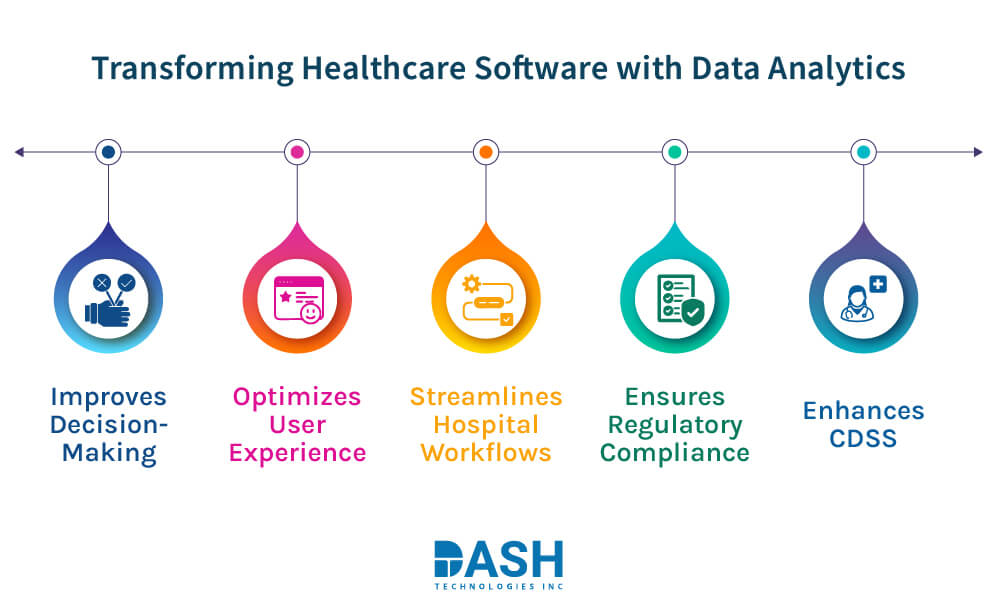Using Data Analytics in Healthcare to Drive Continuous Improvement in Software Services
The healthcare industry is evolving rapidly, and data analytics in healthcare has become a powerful tool for driving innovation, enhancing patient care, and streamlining healthcare services. From health data management to predictive models, advanced data analytics is revolutionizing the way healthcare organizations operate.
By leveraging big data analytics in healthcare, providers and software developers are continuously improving custom healthcare software solutions to deliver better outcomes and optimize resources. In this blog, we will explore how healthcare data analytics drives continuous improvement in healthcare software services, focusing on the critical role of analytics, real-world applications, and the benefits they bring to the healthcare sector.
The Critical Role of Data Analytics in Healthcare

With vast amounts of data generated from clinical, operational, and financial activities, data analytics in healthcare helps organizations make data-driven decisions that enhance efficiency, patient care, and the overall healthcare experience. Here’s how data analytics plays a critical role in improving healthcare software:
-
Improving Clinical Decision Support Systems (CDSS)
CDSS is essential for helping healthcare providers make informed decisions. By integrating healthcare data analytics, CDSS can analyze patient data in real-time, offering actionable insights for clinicians. This improves decision-making by identifying patterns in patient health, predicting potential issues, and providing timely interventions.
-
Enhancing User Experience (UX)
A well-designed, intuitive interface can boost efficiency, while a poor one can lead to delays and errors. Advanced data analytics helps healthcare software developers monitor how users interact with the software, identify bottlenecks, and make informed improvements. This ensures that the system remains user-friendly, responsive, and efficient, which is essential for maintaining smooth operations.
-
Optimizing Workflow and Resource Management
By analyzing data from various sources, healthcare data analytics helps software developers identify inefficiencies in hospital workflows, administrative processes, and resource allocation. This leads to better utilization of resources, reduction of operational costs, and improved overall system efficiency.
-
Ensuring Regulatory Compliance and Data Security
As healthcare organizations handle sensitive data, ensuring compliance with regulations such as HIPAA is crucial. Advanced data analytics helps track user access, flagging any non-compliant behavior or security vulnerabilities. This proactive approach ensures that healthcare software services meet necessary standards, keeping sensitive patient data secure and compliant with regulations.
-
Predictive Analytics for Enhanced Decision-Making
Predictive analytics plays a pivotal role in healthcare software, enabling providers to foresee patient needs, identify potential risks, and optimize care plans. By analyzing historical data and identifying trends, big data analytics in healthcare can forecast potential health issues and optimize clinical decisions, improving patient outcomes.
Top 5 Applications of Data Analytics in Healthcare

Data analytics in healthcare isn’t just about processing vast amounts of data—it’s about applying the insights gained to real-world scenarios to improve patient care, enhance operational efficiency, and support healthcare providers. Below are five key applications where advanced data analytics has been successfully integrated into healthcare software solutions:
-
Predicting Patient Health Outcomes
By utilizing healthcare data analytics, healthcare providers can predict patient outcomes with remarkable accuracy. Using historical data, predictive models can foresee potential complications, enabling providers to intervene early and avoid adverse outcomes. For instance, predictive analytics can help identify patients at risk of developing chronic conditions, allowing for timely preventive care.
-
Enhancing Disease Surveillance and Management
Big data analytics in healthcare is crucial for disease surveillance. By analyzing large datasets from hospitals, clinics, and public health systems, advanced data analytics tools can identify trends in disease outbreaks, track disease progression, and even predict future outbreaks. This information is valuable not just for healthcare providers but also for public health agencies working to control the spread of diseases.
-
Optimizing Resource Allocation
Efficient use of healthcare resources is important to reduce costs and improve patient care. Using data analytics in healthcare, software solutions can analyze historical and real-time data to optimize resource allocation, ensuring that resources (such as medical staff, equipment, and hospital beds) are used efficiently. This results in improved patient flow and reduced wait times, leading to a better overall experience for both patients and healthcare providers.
-
Personalizing Treatment Plans
Advanced data analytics enables healthcare providers to offer personalized treatment plans tailored to each patient’s unique needs. By analyzing a patient’s medical history, lifestyle, genetic data, and other relevant factors, healthcare software can provide recommendations for individualized care, improving treatment outcomes and patient satisfaction.
-
Fraud Detection and Prevention
Health data management solutions powered by big data analytics in healthcare can identify unusual patterns or anomalies in financial and clinical data, flagging potential fraudulent activities. This proactive approach helps healthcare organizations prevent fraud, save costs, and ensure the integrity of their operations.
Benefits of Data Analytics in Healthcare Software Services
The integration of data analytics in healthcare offers several key benefits that enhance healthcare software services. By continuously analyzing data, healthcare organizations and software developers can drive improvement across various aspects of the healthcare system:
-
Improved Patient Care
With healthcare data analytics, providers can make more informed decisions, offer personalized treatment, and predict potential health risks. These capabilities lead to better clinical outcomes and enhanced patient care, ultimately improve the quality of life for patients.
-
Enhanced Software Performance
By integrating advanced data analytics, healthcare software services can be constantly optimized. Data-driven insights allow developers to identify performance bottlenecks, fix bugs, and enhance system functionality, ensuring that software runs smoothly and efficiently.

-
Cost Efficiency
Big data analytics in healthcare helps organizations identify inefficiencies and optimize resources, reducing costs across the board. By automating processes, optimizing staff schedules, and predicting equipment needs, healthcare organizations can save on operational costs without compromising the quality of care.
-
Scalability
As healthcare organizations grow, so does the volume of data they manage. Advanced data analytics helps custom healthcare software solutions scale efficiently by processing large volumes of data without sacrificing performance or speed. This scalability ensures that software systems can grow with the needs of the healthcare provider.
-
Improved Compliance and Security
Data analytics in healthcare also plays a crucial role in ensuring compliance with healthcare regulations, such as HIPAA, GDPR, HITECH Act, FDA 21 CFR Part 11, and ISO 27001.
By continuously monitoring data access, software can detect potential breaches or non-compliant activities, ensuring that sensitive patient data remains secure and protected from unauthorized access.
Challenges in Implementing Data Analytics in Healthcare Software
Despite its many benefits, there are challenges in fully implementing data analytics in healthcare software services:
-
Data Quality and Consistency
For analytics to be effective, the quality of the data is paramount. Healthcare organizations must ensure that data is accurate, complete, and consistent across all platforms.
-
Privacy and Security Concerns
The security of sensitive health information is a top priority. As healthcare data becomes increasingly digitized, ensuring robust encryption, access control, and compliance with privacy regulations is critical.
-
Integration of Data from Multiple Sources
Healthcare software often needs to pull data from multiple sources, which can be a complex task. Health data management systems must ensure seamless integration across diverse platforms, such as EHRs, medical devices, and patient records.
Conclusion
Data analytics in healthcare is a game-changer in the development and optimization of healthcare software services. By integrating healthcare data analytics into custom healthcare software solutions. healthcare organizations can enhance patient care, improve operational efficiency, and stay ahead of regulatory requirements.
The use of advanced data analytics and big data analytics in healthcare ensures that healthcare providers have the insights they need to make data-driven decisions that improve outcomes and reduce costs. With the continuous growth of data, the future of healthcare software lies in leveraging these analytics to drive sustained improvement and better care for patients worldwide.
Looking to harness the power of data analytics in your healthcare solutions? Contact our experts today. We can help you create advanced healthcare software that uses analytics and fits your needs.
About Dash

Dash Technologies Inc.
We’re technology experts with a passion for bringing concepts to life. By leveraging a unique, consultative process and an agile development approach, we translate business challenges into technology solutions Get in touch.







